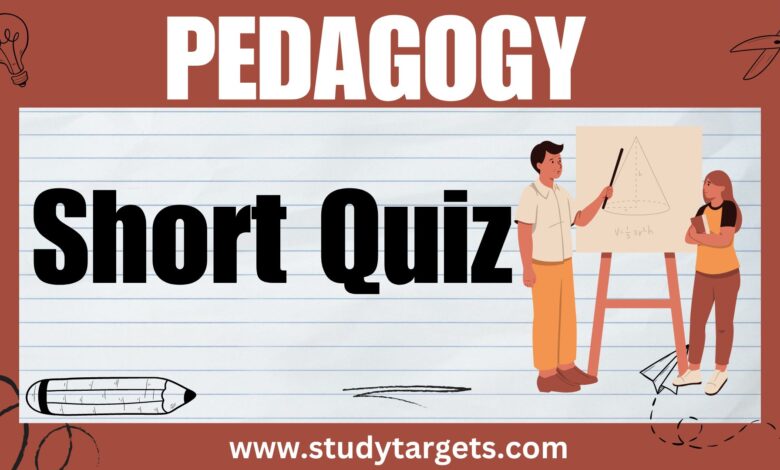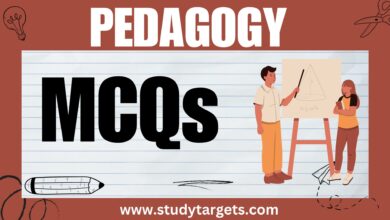PedagogyPedagogy Short Quiz
Short Quiz: Pedagogy Short Quiz

Pedagogy Short Quiz
- What is the primary focus of constructivist teaching?
- Answer: Learning through experience and reflection
- Who proposed the theory of multiple intelligences?
- Answer: Howard Gardner
- What is the purpose of formative assessment?
- Answer: To provide feedback to students and guide instruction
- Which instructional strategy involves students actively engaging in problem-solving?
- Answer: Problem-based learning
- What is metacognition?
- Answer: Thinking about one’s own thinking processes
- What does ‘scaffolding’ mean in education?
- Answer: Providing temporary support to students to achieve learning goals
- Who is associated with the concept of ‘zone of proximal development’?
- Answer: Lev Vygotsky
- What is a key benefit of using rubrics in assessment?
- Answer: Providing clear criteria for performance
- Which learning theory emphasizes the role of reinforcement and punishment?
- Answer: Behaviorism
- What is the primary goal of inclusive education?
- Answer: Ensuring that all students, regardless of ability, learn together
- What does ‘differentiated instruction’ involve?
- Answer: Adapting instruction to meet individual needs
- Which theorist developed the stages of cognitive development?
- Answer: Jean Piaget
- What is the main characteristic of experiential learning?
- Answer: Learning through doing
- What is a ‘growth mindset’?
- Answer: Belief that abilities can be developed through effort
- Which instructional approach combines traditional classroom instruction with online learning?
- Answer: Blended learning
- What is intrinsic motivation?
- Answer: Enjoying the learning process itself
- Which instructional model emphasizes collaboration and student autonomy?
- Answer: Inquiry-based learning
- What does ‘formative assessment’ aim to do?
- Answer: Provide ongoing feedback
- What is the role of the teacher in a student-centered classroom?
- Answer: Facilitator of learning
- Which theory is associated with Albert Bandura?
- Answer: Social Learning Theory
- What is the purpose of summative assessment?
- Answer: To measure student learning at the end of an instructional period
- What is the main focus of the Montessori method of education?
- Answer: Self-directed activity and hands-on learning
- What does ‘peer teaching’ involve?
- Answer: Students teaching other students
- Which learning theory focuses on how individuals process information?
- Answer: Cognitivism
- What is the key characteristic of effective feedback?
- Answer: Timely and specific
- What does ‘student-centered learning’ emphasize?
- Answer: Students’ active participation and choice
- What is the main idea behind cooperative learning?
- Answer: Collaboration and group success
- Which instructional approach involves students learning by solving real-world problems?
- Answer: Problem-based learning
- What is ‘inclusive education’?
- Answer: Ensuring all students, regardless of ability, learn together
- What is the primary focus of inquiry-based learning?
- Answer: Exploring questions and problems
- Who is known for the theory of operant conditioning?
- Answer: B.F. Skinner
- What is the main advantage of using rubrics in assessment?
- Answer: Providing clear criteria for performance
- What is a characteristic of a fixed mindset?
- Answer: Belief that abilities are innate and unchangeable
- What does ‘flipped classroom’ refer to?
- Answer: Students watch lectures at home and do assignments in class
- Which instructional model emphasizes student inquiry and exploration?
- Answer: Inquiry-based learning
- What is the primary focus of direct instruction?
- Answer: Teacher-led and structured teaching
- Which theory emphasizes the importance of social interaction in learning?
- Answer: Social Learning Theory
- What is the role of summative assessment in education?
- Answer: To evaluate student learning at the end of an instructional period
- Which instructional approach involves learning through hands-on activities?
- Answer: Experiential learning
- What is a key characteristic of problem-based learning?
- Answer: Learning through solving real-world problems
- Which theorist is associated with cognitive development stages?
- Answer: Jean Piaget
- What does ‘metacognition’ help students develop?
- Answer: Self-awareness of their learning processes
- What is the main goal of formative assessment?
- Answer: To guide and improve learning during the process
- Which theory is associated with Lev Vygotsky?
- Answer: Sociocultural Theory
- What is the focus of behaviorism in education?
- Answer: Observable behaviors and their reinforcement
- What does ‘scaffolding’ in education aim to do?
- Answer: Support students to achieve learning goals independently
- What is the purpose of project-based learning?
- Answer: To develop problem-solving and critical thinking skills
- What is the main idea behind constructivist teaching?
- Answer: Learning through experience and reflection
- What does ‘blended learning’ combine?
- Answer: Traditional classroom instruction with online learning
- What is the role of intrinsic motivation in learning?
- Answer: Driving engagement through interest and enjoyment
- Which instructional approach is characterized by student autonomy?
- Answer: Inquiry-based learning
- What is the primary benefit of using rubrics?
- Answer: Clear performance criteria
- What does ‘growth mindset’ emphasize?
- Answer: The ability to develop abilities through effort
- What is a ‘flipped classroom’?
- Answer: Students watch lectures at home and do assignments in class
- What is the purpose of formative assessment?
- Answer: Providing feedback and guiding instruction
- Which learning theory is associated with Jean Piaget?
- Answer: Cognitive Development Theory
- What is the role of the teacher in student-centered learning?
- Answer: Facilitator of learning
- What is the primary goal of inclusive education?
- Answer: Ensuring all students learn together
- What is metacognition?
- Answer: Thinking about one’s own thinking processes
- Which theorist is known for operant conditioning?
- Answer: B.F. Skinner
- What does ‘peer teaching’ involve?
- Answer: Students teaching other students
- Which instructional strategy involves hands-on activities?
- Answer: Experiential learning
- What is the main focus of direct instruction?
- Answer: Teacher-led and structured teaching
- What is the benefit of problem-based learning?
- Answer: Developing problem-solving skills
- Which theory emphasizes social interaction in learning?
- Answer: Social Learning Theory
- What is the goal of summative assessment?
- Answer: To measure student learning at the end of a period
- What is the primary focus of constructivist teaching?
- Answer: Learning through experience and reflection
- Which instructional model emphasizes collaboration and student autonomy?
- Answer: Inquiry-based learning
- What is the purpose of formative assessment?
- Answer: To provide feedback and guide instruction
- What does ‘scaffolding’ provide in education?
- Answer: Temporary support to achieve learning goals
- Which theorist developed the stages of cognitive development?
- Answer: Jean Piaget
- What is the primary focus of behaviorism?
- Answer: Observable behaviors and reinforcement
- What is intrinsic motivation?
- Answer: Enjoying the learning process itself
- What does ‘student-centered learning’ emphasize?
- Answer: Students’ active participation and choice
- What is the main idea behind cooperative learning?
- Answer: Collaboration and group success
- Which instructional approach involves solving real-world problems?
- Answer: Problem-based learning
- What is the purpose of inclusive education?
- Answer: Ensuring all students learn together
- Which theory is associated with Lev Vygotsky?
- Answer: Sociocultural Theory
- What does ‘flipped classroom’ refer to?
- Answer: Students watch lectures at home and do assignments in class
- What is the main characteristic of experiential learning?
- Answer: Learning through doing
- What is the role of the teacher in a student-centered classroom?
- Answer: Facilitator of learning
- What is the purpose of summative assessment?
- Answer: To measure student learning at the end of a period
- Which learning theory focuses on information processing?
- Answer: Cognitivism
- What does ‘scaffolding’ in education aim to do?
- Answer: Support students to achieve learning goals independently
- Which instructional model combines traditional and online learning?
- Answer: Blended learning
- What is the main focus of direct instruction?
- Answer: Teacher-led and structured teaching
- What is a ‘growth mindset’?
- Answer: Belief that abilities can be developed through effort
- What is the key characteristic of effective feedback?
- Answer: Timely and specific
- Which theorist is known for operant conditioning?
- Answer: B.F. Skinner
- What does ‘peer teaching’ involve?
- Answer: Students teaching other students
- What is the main advantage of using rubrics in assessment?
- Answer: Providing clear criteria for performance
- Which instructional approach emphasizes student inquiry and exploration?
- Answer: Inquiry-based learning
- What is the role of intrinsic motivation in learning?
- Answer: Driving engagement through interest and enjoyment
- What does ‘student-centered learning’ emphasize?
- Answer: Students’ active participation and choice
- Which theory emphasizes social interaction in learning?
- Answer: Social Learning Theory
- What is the primary focus of constructivist teaching?
- Answer: Learning through experience and reflection
- What is the purpose of project-based learning?
- Answer: Developing problem-solving and critical thinking skills
- Which instructional model emphasizes collaboration and student autonomy?
- Answer: Inquiry-based learning
- What is the main idea behind cooperative learning?
- Answer: Collaboration and group success
- What is metacognition? – Answer: Thinking about one’s own thinking processes

